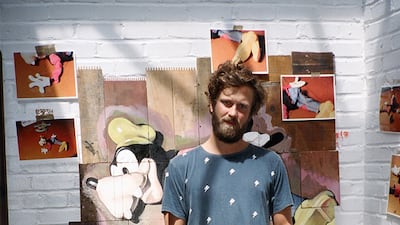In his solo exhibition Everything Should Be OK, at Lawrie Shabibi gallery in Dubai, New York-based British artist Oliver Clegg uses a diverse range of materials including glass, wood, steel, neon, resin and concrete. The works delve into the complexities of modern life using humour and irony.
Your paintings in this show are on old wooden floorboards from a church. What is the significance?
The key element of the work is to not necessarily link subject and surface. The problem with painting on found surfaces is that the work can quite easily fall into the realm of street art – an area that I did not want my work to be considered. Street art is finite in its simplicity and I wanted to make work that was infinite in its enigmatic nature. So while you could say that a lot of the work made in this period was a reflection of the death of my father – just six months before this painting was made – and questions of religion, it’s also deliberately non-deliberate in its stance.
So is it wrong to read a questioning of faith into the work?
The question of faith, or rather a belief in God, is something that everybody considers at different points. The work was made at a time when my questioning of the religious upbringing I had been given was coming clearly into focus.
In many ways your art is very 21st century, when it comes to your choice of many mediums and complex ideas. However you also use traditional material, such as oil paint. Would you say you come from a generation of artists between eras?
In my 20s, I was exposed to two very different sides within the world of art – a very academic schooling in oil portraiture in Florence following an art history degree at Bristol University, and temporary work internships at contemporary art galleries. I subsequently completed a master’s in fine art, which ultimately became a mix of these two very different yet, to me, equally relevant perspectives. I wanted to be a figurative painter but I didn’t just want to represent the physical anatomy of humans, but also express the emotional anatomy of the human condition. I started to figure out ways I could do both.
By cutting the words “The End” out of birth certificates for one of your artworks, you made me think of the almost apocalyptic and bizarre world that we live in. Would you agree that much of your work addresses contemporary culture with a kind of cynical humour?
It would be hard to deny the accusation that I’m cynical. I never used to be but I think it’s just something that is a natural repercussion of existence and experience. I don’t try to be anything that I’m not and in my work I don’t try to present false convictions. I am cynical about the world and we live in a world of cynicism. This is only accelerated by the horrendous political events that we have all witnessed over the past few years.
"Don't You? Don't You?" (an installation of a disco ball in a shipping crate that reflects the words "me, me, me" around the space) is a classic example of this humour. Do you hope we emerge from your exhibition a little more self-aware?
I don’t think that in the 21st century we need any more encouragement to look at ourselves. I doubt many people looked long enough at the sculpture to really get it, as they were probably more interested in taking a good picture of it for other people to see.
• Everything Should Be OK runs until January 5 at Lawrie Shabibi gallery. For more details, visit www.lawrieshabibi.com

